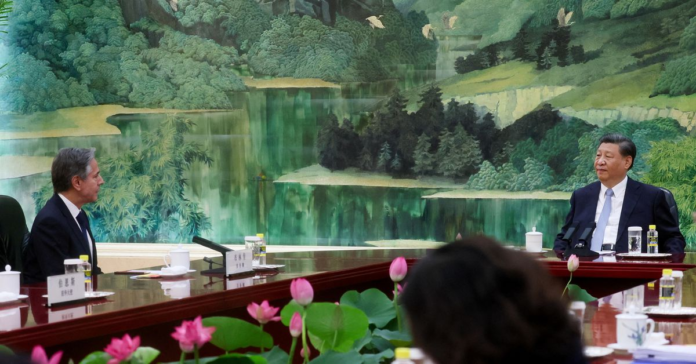LONDON, July 3 (Reuters Breakingviews) – The failed mutiny against Vladimir Putin hasn’t just weakened the Russian president. It is also a setback for his most important ally, Chinese President Xi Jinping. At the same time, China is grappling with a weaker economy and confronted by a stronger American-led alliance. It no longer seems certain to become the world’s top power.
China remains a threat, notably to Taiwan. So the United States and its allies can’t let their guard down. But the new situation may open up chances to work with China on peace and climate change.
The mood has changed a lot in the past two years. In 2021 the United States chaotically pulled out of Afghanistan and its alliance of rich democracies was in disarray.
What’s more, the Chinese economy had kept growing through the Covid-19 pandemic, when all the Group of Seven (G7) rich economies had shrunk. It seemed only a matter of time before China would overtake the United States as the world’s largest economy. Many countries were eager to align themselves with a winner, further enhancing China’s power.
PRICE OF PUTIN
Yet China has since suffered a series of setbacks. Xi’s promise of a “no-limits” partnership with Russia – just before Putin invaded Ukraine – might have been a brilliant ploy if Moscow had won a quick victory. The alliance would have strengthened the impression that the world’s rich democracies could do little to stop a combination of Chinese and Russian power.
But Russia has had a bad war. Now the failed mutiny by mercenaries led by Yevgeny Prigozhin has made Putin look weak and could help Ukraine fight back. China’s support for Russia, and particularly its demand for oil and gas, may not depend too much on who occupies the Kremlin. But its support for Putin has come at a big cost to its international image.
Russia’s invasion galvanised the U.S. and its allies into coordinating in the Pacific and Atlantic oceans and beefing up defence spending. India has also shifted closer to America – with Prime Minister Narendra Modi and U.S. President Joe Biden agreeing deeper cooperation on technology and defence when they met last month.
Meanwhile, countries in the G7, which is becoming the key group for organising Western geopolitical strategy, are jointly “de-risking” their exposure to the Chinese economy and imposing export controls on technology that could help its military, such as advanced semiconductors. The United States is now considering tightening the restrictions on chips used for artificial intelligence.
BAD DEBTS
All of this will hold back an already weak Chinese economy. The government has made a series of errors including its crackdown on tech entrepreneurs and persisting too long with zero-Covid lockdowns.
But China’s big problem is that it has relied on a borrowing binge to prop up growth since the global financial crisis of 2008. Since then the debt of the private and public sector combined has doubled to three times national output. On average, debt has risen by 10 percentage points of GDP a year.
Most of this borrowing has gone into investments with low or even negative returns such as property. Borrowers, including local governments and state-owned companies, are struggling to service their debts, says George Magnus, an economist who has been warning for years that Chinese growth is unsustainable.
There’s no magic solution. Debt restructuring will hit economic growth. But delaying the reckoning will store up bigger problems for the future. And in the long run, the economy won’t grow much because the country’s working-age population will fall fast.
Investors are increasingly worried. In the last two years the yuan has fallen around 12% against the dollar – and the Shanghai Stock Exchange Composite Index (.SSEC) has dropped by around a fifth in dollar terms.
A weaker economy will hold back Beijing’s ability to project power abroad. It won’t be able to ramp up military spending so rapidly. And it won’t be keen to run up more bad debts abroad to win influence in the so-called Global South.
Reuters Graphics
PREPARE FOR WORST, WORK FOR BEST
There are two schools of thought about how China will react to this change in fortunes. One is that it will be reluctant to throw its weight around. The other is that it will feel the pressure to exercise its power soon, before it peaks. Putin’s experience should serve as a cautionary tale. It shows how invading another country can boomerang on the aggressor.
The G7 countries still have to prepare for the worst when it comes to Taiwan. This means strengthening their alliances, while accelerating the process of de-risking their exposure to China.
At the same time, they can work for the best. This means seeking out opportunities to collaborate on issues of common interest, building on last month’s ice-breaking trip to China by U.S. Secretary of State Antony Blinken.
Climate change is an obvious common problem since China and America are the world’s two biggest greenhouse gas polluters – responsible for 26% and 11% of emissions respectively in 2020. Ideally, they would agree to decarbonise their economies more rapidly – and jointly push the rest of the world to do so too.
Such a pact isn’t likely now, not least because Biden can’t get any new bold climate package through Congress. But things might shift after next year’s U.S. elections.
The Ukraine war could be another area for cooperation. Again the time is not ripe, not least because Kyiv is hoping to make big gains on the battlefield. But once this year’s counteroffensive is over, there may be a window to explore peace.
The G7 should keep pushing Xi to use his influence with Putin to sign a deal that respects Ukraine’s sovereignty. At some point, the Chinese president may conclude that the Russian president is such a loser that he should do just that.
The standoff between China and the U.S.-led coalition is still dangerous. But a weakening China probably offers richer democracies more upside than downside.
Follow @Hugodixon on Twitter
Editing by Peter Thal Larsen and Thomas Shum
Our Standards: The Thomson Reuters Trust Principles.
Opinions expressed are those of the author. They do not reflect the views of Reuters News, which, under the Trust Principles, is committed to integrity, independence, and freedom from bias.



